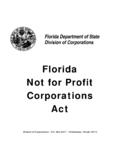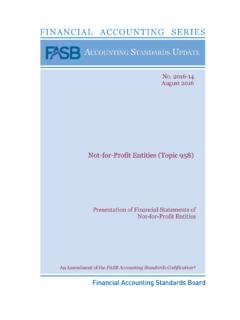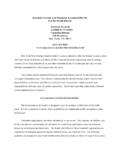Transcription of Drafting and Revising Bylaws for Not-for-profit ...
1 Drafting and Revising Bylaws for Not-for-profit Organizations In AlbertaBoard developmentBoard developmentDrafting and Revising Bylaws for Not-for-profit Organizations In AlbertaA Guidebook2 The Right to Copy this Workbook Permission is given to any Not-for-profit organization to photocopy any or all of this workbook for use within their organization, provided credit is given to the Important Note Before You Get StartedNot-for-profit organizations vary considerably in their make-up, their objectives and their methods of information in this workbook is written generally and may not exactly fit the needs of your organization.
2 It is meant to be a starting point for you to deal with some of the issues which face many Not-for-profit publisher does not give legal or other professional advice. Therefore, if you are doubtful about acting on any information in this workbook or want clarification, you may wish to seek professional advice to make sure it answers your concerns and Muttart Foundation and the Government of Alberta are not liable if you use any of the contents of this workbook. Make sure you have the benefit of professional advice which relates directly to your organization. The Muttart Foundation and Alberta Culture and Community Spirit ISBN 0-9697939-3-6 Printed in Canada First Printing 1994 Revised Edition Printed 1996 Second Revised Edition Printed 1997 Third Revised Edition Printed 1999 Revised Edition 2003 Revised Edition 2008 Revised Edition 2009 Published by: The Muttart Foundation 1150 Scotia Place 10060 Jasper Avenue Edmonton, Alberta T5J 3R8 Phone: (780) 425-9616 FAx: (780) 425-0282 Alberta Culture and Community Spirit Board Development Program 907, 10405 Jasper Avenue Edmonton, Alberta T5J 4R7 Phone: (780) 427-2001 FAx.
3 (780) 427-4155 AcknowledgementsThis workbook was developed by the Board Development Program of Alberta Culture and Community Spirit in collaboration with The Muttart Foundation. The contributions of all those involved in the Board Development Program, including Grant MacEwan College, the Wild Rose Foundation, and the volunteer instructors who deliver the program to Not-for-profit agencies across Alberta, are also acknowledged. Agencies across Alberta are also acknowledged for their contributions to all versions and to the 2007/2008 Review Committee that lead to the version published in to Use tHis GUidebookWelcomeWelcome to the Drafting and Revising Bylaws Guidebook.
4 This Guidebook is designed to give you: An overview to the incorporation of Not-for-profit societies within the province of Alberta Guidelines to consider when incorporating a society and Drafting Bylaws and incorporation documents for a societyThis booklet is only a guide. All suggestions and ideas and techniques within this booklet are offered to you as a set of tools to help you get started. Many of the specific matters and Bylaws suggested are not the only way to deal with the issues discussed. There are many possible and desirable alternatives to fit your particular situation.
5 You will need to tailor many of the ideas and suggestions in this booklet to your particular society. This guidebook is designed to help you do : This Guidebook assumes that your Not-for-profit organization will be incorporated under the Societies Act. This is the statute most often used by Not-for-profit organizations. For that reason, this Guidebook will only cover incorporation under the Societies Act in 1 9 What You Need to Know About IncorporationWhy Incorporate? 9 What are the Options for Incorporation? 11 CHapter 2 13 How to Apply for IncorporationWhat are the Steps for Incorporation?
6 13 What Information Does the Application Require? 14 CHapter 3 19 What You Need to Know About BylawsWhat are Bylaws ? 19 What are the Minimum Requirements? 19 How do You Draft a Good Set of Bylaws ? 20 What are Specific Techniques for Drafting Bylaws ? 21 What are the Contents of Bylaws ? 21 CHapter 4 23 How to Draft Your Bylaws : Introductory ArticlesWhat are Introductory Articles? 23 CHapter 5 25 How to Draft Your Bylaws : MembershipWhat is in the Membership Article? 25 What are Categories of Members? 25 How Does a Person Become a Member? 26 How Does a Person Withdraw From the Society?
7 27 How is a Member Suspended or Expelled? 28 Are Membership Fees in the Bylaws ? 29 What are the Rights and Obligations of Members? 29table of Contents6board developmentCHapter 6 31 How to Draft Your Bylaws : Meetings of the Members of the SocietyWhat is in the Bylaws About Meetings? 31 What is the Annual General Meeting (AGM)? 31 What are Other Regular General Meetings? 33 What are Special Meetings? 34 What are the Procedural Rules for General meetings? 35 CHapter 7 39 How to Draft Your Bylaws : Governance StructureWhat is Governance Structure? 39 What is the Basic Structure? 39 What is the Board of Directors?
8 40 What is the Executive Committee? 44 What are the Officers? 46 What are the other Committees? 48 CHapter 8 50 How to Draft Your Bylaws : Management and FinancesWhat is the Need for These Articles? 50 What is the Registered Office? 50 What is the Seal of the Society? 51 What is the Fiscal Year of the Society? 51 What about the Financial Records and Books of the Society? 52 What About the Minute Books and Other Records of the Society? 53 What About Contracts of the Society? 55 What are the Borrowing Powers of the Society? 55 Will Board Members be Paid Honorariums? 56 What About Indemnity and Protection for Directors and Officers?
9 56 CHapter 9 57 How to Draft Your Bylaws : Fundamental ChangesWhat are Fundamental Changes? 57 What are the Procedural Requirements for These Changes? 57 How can We Make Changes to the Objects or the Bylaws ? 58 What is Dissolution? 58appendiCes 60 Appendix 1 61 Incorporation Under the Companies ActAppendix 2 63 The Societies Act: Application Appendix 3 64 A set of Bylaws : Sample Appendix 4 76 GlossaryAppendix 5 78 Sources of Helpindex 80 How tHis GUidebook worksThis Guidebook has nine chapters. Each chapter gives you information by answering questions. You will find tools, techniques and tips to help you make decisions and draft a good set of Bylaws .
10 7wHy inCorporate?Should your organization be incorporated at all? Before answering this question, review and compare the following advantages and disadvantages of Advantages to IncorporationLimited Liability Incorporation of an organization provides some protection to its members from various debts and obligations for which the organization may become responsible. Lawyers often refer to this as limited liability. What it means is that an incorporated organization becomes, in the eyes of the law, a separate and distinct entity, with its own powers, rights and privileges. As a separate entity in law, the incorporated organization is the one liable for contracts and debts entered into or incurred in its Societies Act states: 21.




